Duration: 2020-2022
Type of project: collective, international
Funding: National Science Fund (Agreement No. KP-06-RUSSIA/23, 15.12.2020); Russian Fund for Fundamental Research (Agreement No. 20 -512-18005)
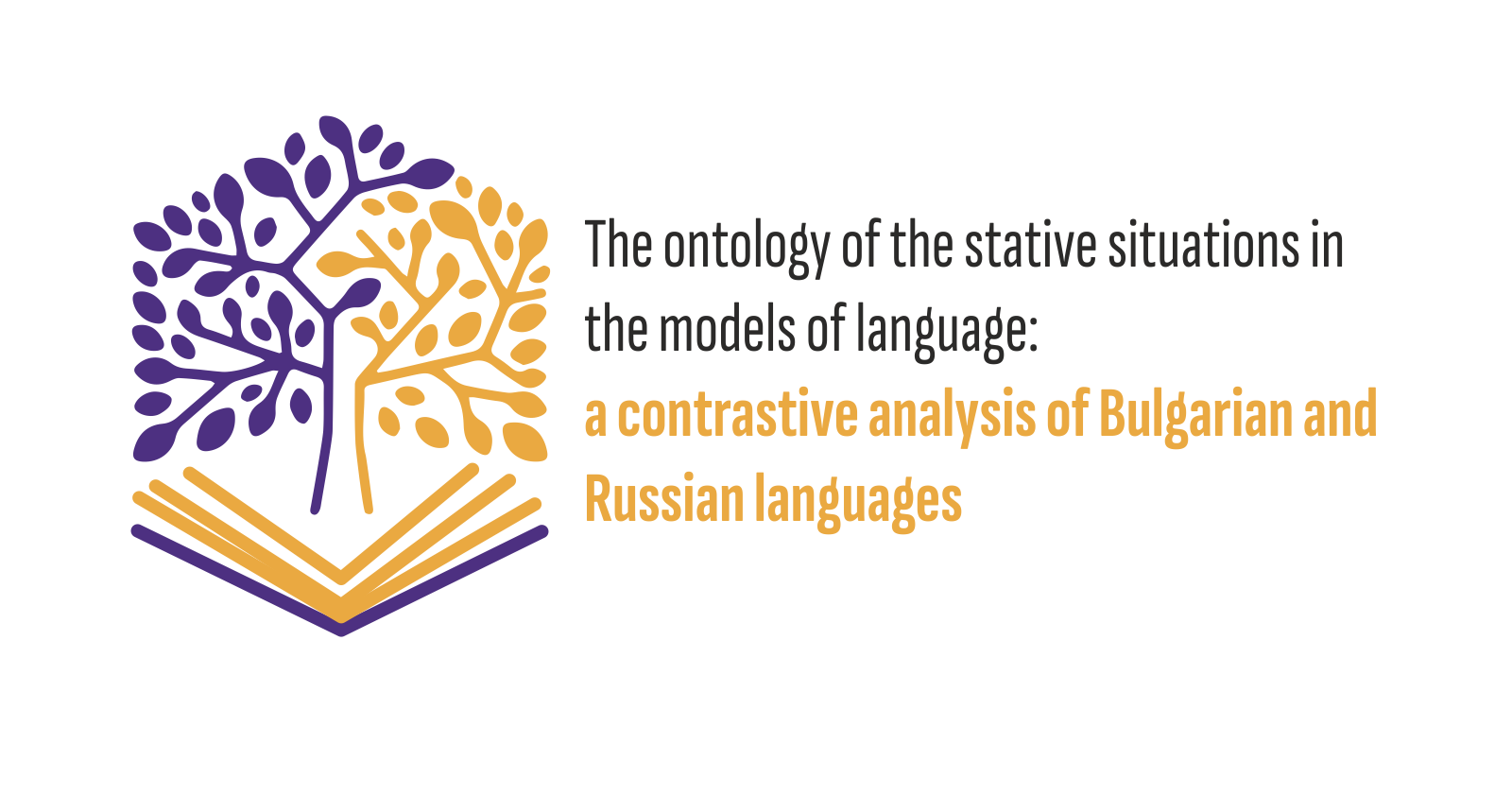
Bulgarian team (Institute for Bulgarian Language, BAS)
Principal Investigator: prof. Svetla Koeva
Team members: prof. Svetla Koeva, prof. Maksim Stamenov, assist. prof. Ts. Dimitrova, assist. prof. S. Leseva, assist. prof. M. Todorova, Ivelina Stoyanova, assist. prof. V. Stefanova, H. Kukova, prof. Yovka Tisheva (associate member), assoc. prof. Marina Dzonova (associate member).
Russian team (St. Petersburg State University)
Principal Investigator: prof. Elena Ivanova
Team members: prof. Elena Ivanova, prof. Galina Kustova, prof. Anton Zimmerling, Alexander Letuchiy, Maria Ovsyannikova, Alexandera Eremchenko, Anastasiya Mosinets
Summary:
The project is focused on stative predicates and their argument structures in Bulgarian and Russian. The research is aimed at presenting typological and semantic description of stative predicates and predicatives, exploring the syntactic realization of their arguments and establishing a set of semantic and grammatical characteristics that govern diathesis and possible alternations. The language modeling will result into an ontology of the stative situations along with the models of conceptualization, lexicalization and grammaticalization of the stative predicates and predicatives in the two languages.
The main objective of the project is to give an abstract ontological representation of the types of state situations based on a set of differentiating semantic features.
Our hypothesis states that since conceptual information reflects the world around us and allows for cross-lingual communication, such abstract language independent description can be achieved through comparative analyses on different languages.
To this end, the following results need to be accomplished:
- Description of the semantic and syntactic models of the stative situations in Bulgarian and Russian.
- Comparison of semantic and syntactic models of the types of state situations in Bulgarian and Russian.
- Description of the differentiating semantic features and their parameters for the realization of diathesis and alternations with the types of stative situations in Bulgarian and Russian.
- An investigation of the current use of stative predicates and predicatives in different thematic fields in Bulgarian and Russian.
A prerequisite for achieving the main goal and the specific objectives is the study of the modern state of the usage of stative predicates and predicatives in various domains in Bulgarian and Russian. This aspect of the study is based on the fact that reliable theoretical knowledge can be drawn from quantitative and distributive analysis using advanced language technologies.
Another goal achieved by the above is to outline the main similarities and differences in models of conceptualisation, lexicalisation and grammaticalisation in expressing various types of statives in Bulgarian and Russian. The expectations based on previous research are that the two languages will demonstrate a number of typological similarities with respect to impersonal sentences with stative predicates and predicatives with a central semantic role of Experiencer.
The main result of the project will be the abstract (and as far as possible, language independent) ontological representation of the types of statives based on a set of semantically distinctive features and their parameters. This result will be based on several more particular results: formulation of an abstract set of semantic distinctive features and their parameters, which are necessary for the semantic description of the types of statives; the formulation of semantic distinctive features and their parameters, which are necessary for the description of diatheses and alternatives; formulating verification tests that ensure the reliability of the conclusions. The new knowledge is related to the fact that the ontological representation will be applicable to different languages because the semantic distinctive features (to a large extent) will be linguistically universal.
To achieve the main result the following will be accomplished:
- Description of semantic and syntactic patterns for realisation of the various types of statives in Bulgarian and Russian.The description will include the following for both Bulgarian and Russian: semantic classification of stative predicates and predicatives; formulation of semantic distinctive features and parameters necessary for the semantic description of the types of statives in Bulgarian and Russian; detailed syntactic and semantic analysis of the subclasses of stative predicates and predicatives and their corresponding arguments. Detailed semantic classification of stative predicates and predicatives and detailed syntactic and semantic analysis of different subclasses have not been offered so far.
- Comparison between semantic and syntactic models for realisation of types of statives in Bulgarian and Russian.The result will be presented as an analysis of the similarities, the identity and the differences between stative predicates and predicatives and their surroundings (arguments’ and adjuncts’ realization) in Bulgarian and Russian. The comparison will be performed on the basis of the collected empirical material and the summaries of the syntactic and semantic structure of the subclasses of predicates and predicatives. Such a large-scale comparative study has not been proposed so far, and not only for the selected pair of languages for comparison.
- Description of the distinctive features and their parameters which determine the realisation of diatheses and alternations in expressing various types of statives in Bulgarian and Russian.The expected result is to establish the set of semantic and grammatical characteristics that determine the realisation of diatheses and the possible alternations between them, which will facilitate the formulation of distinctive features and their parameters within which the diatheses and alternatives are realised. The consequence of this result will be the differentiation of the subclasses of state predicates and predicatives which are characterised by the same sets of diatheses and alternations. The novelty in the proposed approach is the theoretical justification and prediction for the realised diathesis and alternations, and the research conclusions will be based on the reliability of the empirical material.
- Study of the modern state in the use of state predicates and predicatives in various domains in Bulgarian and Russian.Empirical material will be collected for Bulgarian and Russian which will demonstrate the linguistic realisation of stative predicates and predicatives. We will make observations, analysis and conclusions on the frequency, distribution and translational equivalents of stative predicates and predicatives in Bulgarian and Russian. The corpora and lists of examples will be released openly.
- Outlining the main similarities and differences in the models for conceptualisation, lexicalisation and grammaticalisation in expressing the meaning of statives in Bulgarian and Russian.
The main typological similarities and differences between the two languages will be outlines with respect to the semantics and the syntactic realisation of stative predicates and predicatives.
The indicators for the successful accomplishment of the project include (for the Bulgarian team):
- Three studies (at least 2 published in international journals), three conference presentations and three publication in conference proceedings focused on the semantic and syntactic characteristics of stative predicates in Bulgarian.
- Database of extracted examples illustrating stative predicates in Bulgarian and Russian (at least 1 000 sentences).
- Three studies (at least 2 published in international journals), three conference presentations and three publication in conference proceedings focused on the semantic and syntactic characteristics of stative predicatives in Bulgarian.
- Database of extracted examples illustrating stative predicatives in Bulgarian and Russian (at least 1 000 sentences).
- Five chapters in a collection (published by an academic pulisher within the project) which discusses the problems of the comparison between Bulgarian and Russian in expressing stative predicates and predicatives; semantic and syntactic description of diatheses and alternations in stative predicates and predicatives; building an abstract ontological model of the types of statives and the stative predicates and predicatives in Bulgarian and Russian.
- Five joint publications with the Russian researchers published in refereed and indexed journals focused on the comparison between Bulgarian and Russian with respect to the semantic and syntactic structures for expressing stative predicates and predicatives and their ontological representation.
- Four joint presentations with the Russian researchers presented at conferences, as well as four joint publications in conference proceedings dedicated to the comparison between Bulgarian and Russian with respect to the semantic and syntactic structures for expressing stative predicates and predicatives and their ontological representation.
The main results of the projects are as follows:
The main result of the project is the abstract ontological representation of the stative types based on a set of semantic differentiating features and their parameters. This result is based on several more concrete results: formulation of an abstract set of semantic differentiating features and their parameters which are necessary for the semantic description of stative types; formulation of semantic differentiating features and their parameters which are necessary for the description of diatheses; formulating verification tests that ensure the credibility of the conclusions. The ontological representation is applicable across languages because semantic differentiating features are (to a large extent) linguistically universal.
The following research was performed in order to achieve the main goal:
- Description of the semantic and syntactic patterns representing the usage of the stative types in Bulgarian and Russian. The description includes separately for Bulgarian and Russian: semantic classification of predicates and state predicatives; formulation of semantic differentiating features and parameters necessary for the semantic description of the types of statives in Bulgarian and in Russian; detailed syntactic and semantic analysis of the separate subclasses in both languages.
- Comparison of the semantic and syntactic models of realization of the types of states in Bulgarian and Russian. The result covers the analysis of the similarities and differences of stative predicates and predicatives and the context they appear in (arguments and adjuncts) in Bulgarian and Russian. The comparison is made on the basis of the collected empirical material and the generalisations about the syntactic and semantic structure of the subclasses of predicates and predicatives. Such a large-scale comparative study has not been presented so far, and not only for the selected pair of languages for comparison but in general.
- Description of the semantic differentiating features and their parameters within which the diatheses are realised when expressing the types of statives in Bulgarian and Russian. The result reflects the efforts towards establishing the set of semantic and grammatical characteristics that determine the realisation of derivative stative diatheses. A consequence of this result is the identification of subclasses of stative predicates characterised by identical sets of diatheses. The novelty of the proposed approach is the theoretical justification on the basis of which predictions are made about the realised diatheses, and the scientific evidence is drawn from the empirical material.
- Formulation of the semantic differentiating features and their parameters necessary for the ontological representation of state types. An abstract ontological representation of stative types is defined based on a set of semantic differentiating features. This makes possible the typological description of stative predicates and predicatives and the highlighting of language-specific and universal features at the semantic and the syntactic level.
- Study of the present state in the use of stative predicates and predicatives in different thematic domains in Bulgarian and Russian. Linguistic material for Bulgarian and Russian was extracted, illustrating the linguistic realisation of stative predicates and predicatives. The corpus of parallel sentences in Bulgarian and Russian includes usage examples of stative predicates and predicates and is openly available. Observations, analyses and generalisations have been made regarding the frequency, distribution and translation correspondences of stative predicates and predicatives in Bulgarian and Russian.
- Highlighting the main similarities and differences in the models for conceptualisation, lexicalisation and grammaticalisation in expressing stative meaning in Bulgarian and Russian. Typological similarities and differences between the two languages are outlined in terms of semantics and syntactic realisation of stative predicates and predicatives. The theoretical significance of the study consists in the comparison of similarities and differences in the conceptualisation of different types of statives, which correlate with the grammatical structure of the two languages and are reflected at the lexical level.
The project contributes to the clarification of the nature of predication and its manifestations in view of the modern state of Bulgarian and Russian. It also provides an opportunity for in-depth research on each loanguage separately, as well as in comparison, with a focus on the semantic and syntactic constructions for expressing different types of stative meaning. The comparison between Bulgarian and Russian enables to uncover general Slavic features as well as language-specific features in each language.
The indicators for the successful implementation of the project are as follows:
- Instead of the planned 6 studies (with at least 4 published in international journals), 6 papers reported at conferences and published in conference proceedings, in the first year of the project we delivered 11 studies (5 in international journals, out of which one jointly with members of the Russian team), 12 papers published in conference proceedings (1 joint), 15 presentations at conferences and forums.
- The database of usage examples showing stative predicates in Bulgarian and Russian includes 1633 parallel sentences in Bulgaian and Russian instead of the planned 1000.
- The database of usage examples showing stative predicatives in Bulgarian and Russian includes 1078 parallel sentences in Bulgaian and Russian instead of the planned 1000.
- Instead of the planned 5 chapters in a collective monograph (published by an academic publisher within the project) covering the comparative study of stative predicates and predicatives in Bulgarian and Russian; semantic and syntactic description od the diatheses of stative predicates; abstract ontological model of stative types and the typology of stative predicates and predicatives we have delivered 16 chapters and a preface in a collective monograph (5 joint with the Russian team).
- With respect to thei contrastive study of the syntactic and semantic structure of stative predicates and predicatives in Bulgarian and Russian and the ontological presentation of dirrerent types of stative meaning in the second year we have planned 4 joint publications in journals indexed in databases, 8 papaers presented at conferences and published in conference proceeding volumes. We have delivered 4 joint publications in editions indexed in databases, 23 papers presented at international conferences, 21 papers published in conference proceedings and the remaining 2 pending publication.
➥ First Bilateral Seminar, 26.06.2021
➥ Second Bilateral Seminar, 27.11.2021
First Bilateral Seminar, 26.06.2021
The seminat took place on 26.06.2021, 11:00 – 14:30, online on Zoom. The programme included the following presentation:
- Anton Zimmerling: “Конструкция” и “структура”: предложения с инфинитивами и предложения с предикативами / Construction and structure: sentences with infinitives and sentences with predicatives (presentation)
- Alexandr Letuchiy: Actantial structure of predicates and actantial structure of verbs
- Elena Ivanova: State as cause (presentation)
- Marina Dzhonova: Syntactic description of stative predicates (presentation)
- Svetlozara Leseva, Hristina Kukova, Ivelina Stoyanova: Comparative study of existing theories on stative predicates (presentation)
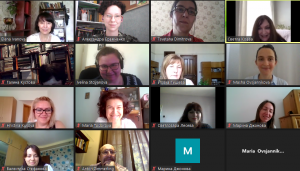 |
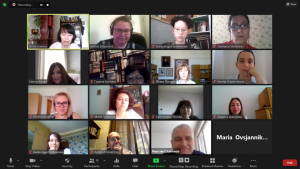 |
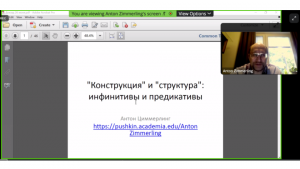 |
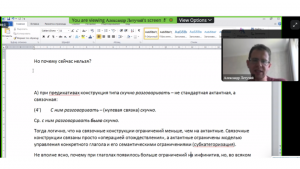 |
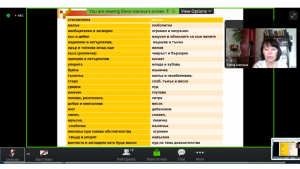 |
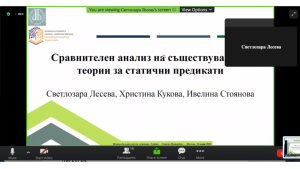 |
Second Bilateral Seminar, 27.11.2021
The seminar took place on 27.11.2021, 11:00 – 14:30, online via Zoom.
Topic of the seminar: Presentation of results obtained by the Bulgarian and the Russian teams within the project Ontology of Stative Situations – Linguistic Modeling. A Contrastive Bulgarian-Russian Study with the support of the Russian Funamental Research Fund (No 20-512-18005) and the Bulgarian National Science Fund (No КП-06-П РУСИЯ-78, 2020).
The Bulgarian team presented the results of Work Package 1 “Semantic and syntactic properties of stative predicates in Bulgarian” and Work Package 2 “Semantic and syntactic properties of stative predicatives in Bulgarian”:
- Svetlozara Leseva, Ivelina Stoyanova, Hristina Kukova: Activity 1.1 – Presentation of stative predicates in linguistic studies: conceptions, challenges, solutions.
- Svetlozara Leseva, Ivelina Stoyanova, Hristina Kukova: Activity 1.2 – Creating a database of parallel usage examples of stative predicates.
- Svetla Koeva: Activity 1.3 – Presenting the semantic structure of stative predicates in Bulgarian. Semantic classification of stative predicates.
- Yovka Tisheva: Activity 1.4 – Описание на синтактичната структура на предикатите за състояние в български език.
- Tsvetana Dimitrova, Maria Todorova, Valentina Stefanova: Activity 2.1 – Presentation of stative predicatives in linguistic studies: conceptions, challenges, solutions.
- Tsvetana Dimitrova, Maria Todorova, Valentina Stefanova: Activity 2.2 – Creating a database of parallel usage examples of stative predicatives.
- Maksim Stamenov: Activity 2.3 – Presenting the semantic structure of stative predicatives in Bulgarian. Semantic classification of stative predicatives.
- Marina Dzhonova: Activity 2.4 – Description of the syntactic structure of stative predicatives in Bulgarian.
The Russian team presented the results of Work Package 3 “Statives in the semantic typology. Semantic and syntactic structure of stative predicates in Russian” and Work Package 4 “Semantic and syntactic properties of stative predicates in Russian”:
- Elena Ivanova, Galina Kustova, Anton Zimmerling: Activity 3.1 – The category “state” in semantic typology.
- Galina Kustova, Maria Ovsjannikova, Elena Ivanova, Alexander Letuchiy, Alexandera Eremchenko: Activity 3.2 – Creating a database of usage examples of stative predicates in Russian.
- Galina Kustova, Anton Zimmerling, Maria Ovsjannikova: Activity 3.3 – Semantic classification of stative predicates and semantic functional aspects of verb stative predicates.
- Alexander Letuchiy, Maria Ovsjannikova, Anton Zimmerling: Activity 3.4 – Syntactic structure of stative predicates in Russian.
- Elena Ivanova, Galina Kustova, Maria Ovsjannikova, Alexandera Eremchenko: Activity 4.1 – Creating a database of usage examples of stative predicatives.
- Anton Zimmerling, Elena Ivanova: Activity 4.2 – Semantic classification of stative predicatives and semantic functional aspects of non-verb stative predicates.
- Elena Ivanova, Galina Kustova, Alexander Letuchiy, Anton Zimmerling: Activity 4.3 – Syntactic structure of stative predicatives in Russian. Constructions presenting stative meaning with verb and non-verb predicates.
Special efforts were invested into the compilation of a database of excerpted usage examples of stative predicates (presentation) and stative predicatives (presentation).
 |
 |
 |
 |
 |
 |
 |
 |
 |
 |
 |
 |
 |
 |
 |
 |
 |
 |
➥ Thematic session within the eight edition of the Grammatical Forum
➥ Thematic session within the International Jubilee Conference of the Institute for Bulgarian Language 2022
➥ Round table at the Russian forum Grammar Processes and Systems in Synchronic and Diachronic Aspects
Thematic session within the eight edition of the Grammatical Forum
On the 21st and 22nd October 2021, a special thematic session was dedicated to the project within the eighth edition of the Grammatical Forum, which is organised jointly with Sofia University. Working groups from the Bulgarian and the Russian teams took part in the forum. Results of the planned activities were presented by Anton Zimmerling (Alexander Pushkin State Institute of Russian Language, Moscow, Russia) and Elena Ivanova (St. Petersburg State University, Russia), who reported on the topic “Chameleon sentences: Rus. „Нечего рассказать“; „Негде спать“ in view of their Bulgarian equivalents”. From the Russian team, presentations were also given by Alexander Letuchiy (National Research University “Higher School of Economics”, Moscow, Russia) on the topic “Null subject and null complement in the Russian language – ellipsis, null pronoun or PRO” and Maria Ovsjannikova (Institute for Linguistic Studies, Russian Academy of Sciences) on the topic “Instrumental encoding of the stimulus and diachronic development of emotional state verbs in the Russian language”.
Prof. Maksim Stamenov from the Institute of Bulgarian Language reported on the semantic properties of predicatives for internal states with dative subject, which is part of Activity 2.3 “Description of the semantic structure of stative predicates in Bulgarian”. The semantic classification of state predicates in Bulgarian was presented by prof. Svetla Koeva from the Institute of Bulgarian Language, which is part of Activity 1.3 “Presentation of the semantic structure of stative predicates in Bulgarian. Semantic Classification of Stative Predicates”. The authors Yovka Tisheva and Marina Dzhonova from Sofia University presented a report on the topic “Argument structure of selected pairs of stative predicates and predicatives”, as part of their work on Activity 1.4 “Description of the syntactic structure of stative predicates in Bulgarian”.
Thematic session within the International Jubilee Conference of the Institute for Bulgarian Language 2022
At the International Jubilee Conference of the Institute for Bulgarian Language, held between 15th and 17th May 2022 there was a specialised session dedicated to the domain of the project. Prof. Anton Zimmerling (Institute of Linguistics, Russian Academy of Sciences) delivered a plenary talk titled Existentials, Modals and the Ontology of States. Galina Kustova (Institute for Russian Language, Russian Academy of Sciences) presented her work “Semantic and Syntactic Properties of Sensitives”. Constructions expressing mental experiences with a dative clitic in the Bulgarian language were discussed by Maksim Stamenov (Institute for Bulgarian Language). Elena Ivanova (St. Petersburg State University, Russia) presented the paper “Participle forms as depictives: Bulgarian-Russian parallels”. Yovka Tisheva (Sofia University) presented her paper “Adjuncts to Verbs Expressing Emotional States”. Marina Dzhonova (Sofia University) delivered a presentation on a paper co-authored with Alexander Letuchiy (St. Petersburg State University, Russia) on the topic “Dative complement or prepositional phrase with predicatives in Russian and Bulgarian – competition and specifics”. Hristina Kukova (Institute for Bulgarian Language) presented a work co-authored with Maria Ovsjannikova (Institute for Linguistic Studies, St. Petersburg, Russia) on the topic “Comparative analysis of the verbs виждам – видя and видеть – увидеть and their complements in Bulgarian and Russian”. Valentina Stefanova (Institute for Bulgarian Language) presented a paper on the topic “Attempt at the classification of stative predicatives”.
Round table at the Russian forum Grammar Processes and Systems in Synchronic and Diachronic Aspects
Within the Russian Forum “Grammar Processes and Systems in Synchronic and Diachronic Aspect”, Moscow, Institute of the Russian Language, which took place between 13th abd 15th June 2022, a round table was organised on the topic “Questions of the grammar of Bulgarian”. Marina Dzonova (Sofia University) took part in the round table and presented a study on stative constructions in Bulgarian from the point of view of their syntactic analysis. In their presentation “На вкус и цвет товарищей нет” (You can’t make friends based on favourite taste or colour) the authors Elena Ivanova (St. Petersburg State University, Russia) and Svetlozara Leseva (Institute for Bulgarian Language) reported their observations on the epistemic subject in predicates of perception in Bulgarian. Bulgarian passive diatheses were discussed by Svetla Koeva (Institute for Bulgarian Language). Maksim Stamenov (Institute for Bulgarian Language) presented his work on the topic “Sentences without subjects, impersonal verbs and forms of expressions of the subject in Bulgarian”. The temporal modifiers of stative predicates in Bulgarian were discussed by Yovka Tisheva (Sofia University), and the idiomatic combinations of predicatives in Bulgarian were presented by Maria Todorova (Institute for Bulgarian Language). Authors Hristina Kukova (Institute for Bulgarian Language) and Maria Ovsjannikova (Institute for Linguistic Studies, St. Petersburg) shared their observations on sentence arguments for predicates describing visual and auditory perceptions in Bulgarian and Russian.
➥ Publications of the Bulgarian team
➥ Publications of the Russian team
➥ Published reviews
➥ Presentations of the Bulgarian team
➥ Presentations of the Russian team
➥ Lectures and seminars
Publications of the Bulgarian team
Publications in journals with impact rank
- Leseva, S., I. Stoyanova, H. Kukova. Towards a Classification of Stative Verbs in view of Corpus Data. – In: Jazykovedný časopis, vol. 72, No. 2, 2021, pp. 383–393. ISSN:0021-5597, DOI:10.2478/jazcas-2021-0035, 383-393. SJR (Scopus):0.19 Q2 (Scopus) (линк)
Publications in refereed journals:
2021
- Джонова, Марина. Синтактично описание на предикативите за ментално състояние. – В: Zeszyty Cyrylo-Metodiańskie. 2021, Vol. 10, pp. 158 – 182. (линк) (реферира се и се индексира в ERIH Plus)
- Иванова, Е. Ю., М. Джонова, С. Лесева. Инхоативная деривация в болгарском языке: предикаты состояний и их производные. – В: Acta linguistica petropolitana. Труды Института лингвистических исследований. 2021, Vol. 17.3, pp. 218 – 287. (линк) (РИНЦ, SCOPUS, WoS (RSCI)) DOI:10.30842/alp23065737173218287
- Коева, Св. Предикати за състояние: свойства и лингвистични тестове. – В: Zeszyty Cyrylo-Metodiańskie. 2021, Vol. 10, pp. 137 – 157. (линк) (реферира се и се индексира в ERIH Plus)
- Лесева, С., Х. Кукова, И. Стоянова. Предикатите за състояние в съвременните лингвистични теории (I). – В: Български език. 2021, 68, 3, с. 120 – 134. (линк) (реферира се и се индексира в ERIH Plus и CEEOL)
- Лесева, С., Х. Кукова, И. Стоянова. Предикатите за състояние в съвременните лингвистични теории (II). – В: Български език. 2021, 68, 4, с. 135 – 152. (линк) (реферира се и се индексира в ERIH Plus и CEEOL)
- Стаменов, М. Конструкциите с предикативи за психически състояния в българския език – номенклатура и диференциални характеристики. – В: Zeszyty Cyrylo-Metodiańskie. 2021, Vol. 10, pp. 76 – 113. (линк) (реферира се и се индексира в ERIH Plus)
- Тишева, Й. Наблюдения върху синтактичната реализация на предикати за емоционални състояния. – В: Zeszyty Cyrylo-Metodiańskie. 2021, Vol. 10, pp. 114 – 136. (линк) (реферира се и се индексира в ERIH Plus)
- Тодорова, М., В. Стефанова, Цв. Димитрова. Предикативи за състояние: концепции, класификации и проблеми. – В: Проглас. 2021, год. 30, кн. 2, с. 215 – 228. (линк) (реферира се и се индексира в в ERIH Plus и CEEOL)
- Джонова, М. Синтактично описание на предикативите за физиологично състояние. – В: Научни трудове на Пловдивския университет „Паисий Хилендарски“. 2021, Т. 59, кн. 1, сб. А – Филология, Пловдивско университетско издателство, с. 211 – 220. (линк) (реферира се в CEEOL)
- Димитрова, Цв., М. Тодорова, В. Стефанова. Езикова реализация на предикативни конструкции за състояние – корпусно изследване. – В: Научни трудове на Пловдивския университет „Паисий Хилендарски“. 2021, Т. 59, кн. 1, сб. А – Филология, Пловдивско университетско издателство, с. 198-210. (линк) (реферира се в CEEOL)
- Тишева, Й. За синтаксиса на емоциите. – В: Научни трудове на Пловдивския университет „Паисий Хилендарски“. 2021, Т. 59, кн. 1, сб. А – Филология, Пловдивско университетско издателство, с. 186-197. (линк) (реферира се в CEEOL)
- Тодорова, М., Цв. Димитрова, В. Стефанова. Предикативи за състояние в български – разновидности и граници. – В: Съпоставително езикознание. 2021, кн. 4, с. 21 – 46. (линк) (реферира се в Ulrich’s Serials Analysis System, ANVUR, CEOL)
2022
- Джонова, М. Предикативи за състояние в български – синтактично описание. – В: Известия на Института за български език „Проф. Л. Андрейчин“. 2022, Т. 35, с. 122 – 140. (линк) (реферира се и се индексира в РИНЦ и CEEOL)
- Коева, Св. Семантична класификация на предикатите за състояние в български. – В: Български език. Приложение 2022 с приноси към Осмия форум „Българска граматика“. София, 2022, с. 367 – 389. (линк) (реферира се и се индексира в ERIH Plus и CEEOL)
- Ovsjannikova, M., H. Kukova. Clausal complements of visual perception verbs in Bulgarian and Russian. – In: Slavia Journal for Slavic Philology. 2022. (под печат) (реферира се в CEEOL)
- Стаменов, М. Едносъставни глаголни изречения, безлични глаголи, предикативи и форми за изразяване на субективност в българския език. – В: Български език. Приложение 2023 с приноси към Деветия форум „Българска граматика“ на тема „Учението за частите на речта – традиция и перспективи“. 2022. (под печат) (реферира се ERIH Plus и в CEEOL)
- Тишева, Й. Положителни емоции и предикати. За веселието. – В: Известия на Института за български език „Проф. Л. Андрейчин“. 2022, Т. 35, с. 90 – 121. (линк) (реферира се и се индексира в РИНЦ и CEEOL)
- Dzhonova, M. Stative constructions in Bulgarian – a syntactic description. – В: Грамматические процессы и системы в синхронии и диахронии, Москва: Институт русского языка. 2022, с. 49 – 50. (линк) (реферира се и се индексира в РИНЦ)
- Джонова, М., Св. Лесева, Е. Иванова. Предикатите за състояние от гледна точка на фазисната деривация: българско-руски паралели. – В: Чуждоезиково обучение. 2022, т. 49, бр. 4, с. 327 – 343. (линк) (реферира се в WOS, CEEOL, ERIH Plus)
- Иванова, Е., М. Стаменов. Пълни и кратки форми на прилагателните имена в руски и техните български съответствия в българския език. – В: Чуждоезиково обучение. книжка 6/2022, година XLIX, 2022. (линк) (реферира се в WOS, CEEOL, ERIH Plus)
- Иванова, Е., Св. Лесева. „На вкус и цвет товарищей нет“: эпистемический субъект при предикатах восприятия в болгарском языке. – В: Грамматические процессы и системы в синхронии и диахронии, Москва: Институт русского языка. 2022, с. 50 – 55. (линк) (реферира се и се индексира в РИНЦ)
- Koeva, Sv. Bulgarian passive diathesis. – В: Грамматические процессы и системы в синхронии и диахронии, Москва: Институт русского языка. 2022, с. 56 – 60. (линк) (реферира се и се индексира в РИНЦ)
- Кукова, Х., М. Овсянникова. Сентенциальные аргументы при предикатах зрительного и слухового восприятия в болгарском и русском языках. – В: Сборник тезисов конференции „Грамматические процессы и системы в синхронии и диахронии“, Институт русского языка им. В. В. Виноградова. Москва 2022, с. 60 – 62. (линк) (реферира се и се индексира в РИНЦ)
- Летучий, А., М. Джонова. Cпособы оформления одушевлённого участника при предикативах в русском и болгарском языках. – В: Русская реч. 2022 № 5. с. 26–46. (линк) (реферира се и се индексира в Scopus)
- Стаменов, М. Принос към семантичната характеристика на предикативите за вътрешни преживявания със субект в дателен падеж. – В: Български език. Приложение 2022 с приноси към Осмия форум „Българска граматика“. 2022, с. 351 – 366. (линк) (реферира се и се индексира в ERIH Plus и CEEOL)
- Стаменов, М. Предложения без подлежащих, безличные глаголы и формы выражения субъективности в болгарском языке. – В: Сборник тезисов конференции „Грамматические процессы и системы в синхронии и диахронии“, Институт русского языка им. В. В. Виноградова. Москва, 2022, с. 13–15 юни 2022, с. 20 – 22. (линк) РИНЦ (реферира се и се индексира в РИНЦ)
- Тишева, Й., М. Джонова. Аргументна структура на някои двойки статични предикати и предикативи. – В: Български език. Приложение 2022 с приноси към Осмия форум „Българска граматика“. с. 390 – 410. (линк) (реферира се и се индексира в ERIH Plus и CEEOL)
- Tisheva, Y. Temporal and Manner Modifiers of Stative Predicates in Bulgarian. – В: Сборник тезисов конференции „Грамматические процессы и системы в синхронии и диахронии“, Институт русского языка им. В. В. Виноградова. Москва 2022, с. 64–67. (линк) (реферира се и се индексира в РИНЦ)
- Tisheva, Y., M. Dzhonova. Syntactic characteristics of emotive predicates in Bulgarian. A corpus-based study. – In: Proceedings of the Fifth International Conference Computational Linguistics in Bulgaria (CLIB 2022). Sofia: Bulgarian Academy of Sciences, 2022. pp. 75–81. (линк) (индексира се в Scopus и ACL anthology)
- Todorova, M. Idioms With Predicatives In Bulgarian. – В: Сборник тезисов конференции „Грамматические процессы и системы в синхронии и диахронии“, Институт русского языка им. В. В. Виноградова., Москва, 2022, с. 67–71. (линк) (реферира се и се индексира в РИНЦ)
Submitted publications for referencing and indexing:
2021
- Коева, Св. Към типологичен анализ на комплементността в български. – В: С. Коева, М. Стаменов (съставители) Доклади от Международната годишна конференция на Института за български език „Проф. Любомир Андрейчин“ (София, 2021), т. 2, София:, Т. 2, Издателство на БАН „Проф. Марин Дринов“, 2021, с. 13 – 27. (линк) (подадено за рефериране и индексиране в WOS)
- Стаменов, М. Групи глаголи за вътрешни психически преживявания. Опит за класификация. – В: С. Коева, М. Стаменов (съставители) Доклади от Международната годишна конференция на Института за български език „Проф. Любомир Андрейчин“ (София, 2021). II том. София: Издателство на БАН „Проф. Марин Дринов“, 2021, с. 69 – 75. (линк) (подадено за рефериране и индексиране в WOS)
2022
- Коева, Св. Система на диатезите в български. – В: Св. Коева, М. Стаменов (съставители) Доклади от Международната годишна конференция на Института за български език „Проф. Любомир Андрейчин“ (София, 2022). София: Издателство на БАН „Проф. Марин Дринов“, 2022, с. 80 – 91. (линк) (подадено за рефериране и индексиране в WOS)
- Кукова, Х., М. Овсянникова. Съпоставителен анализ на глаголите виждам – видя и видеть – увидеть и комплементите им в български и руски език. – В: Св. Коева, М. Стаменов (съставители) Доклади от Международната юбилейна конференция на Института за български език „Проф. Любомир Андрейчин“. София, Институт за български език, 15–17 май 2022 г. София: Академично издателство „Проф. Марин Дринов“, 2022, с. 248 – 256. (линк) (подадено за рефериране и индексиране в WOS)
- Лесева, Св., Ив. Стоянова. Концептуална структура на предикати за състояние върху материал на български и руски. – В: Св. Коева, М. Стаменов (съставители) Доклади от Международната годишна конференция на Института за български език „Проф. Любомир Андрейчин“ (София, 2022). София: Издателство на БАН „Проф. Марин Дринов“. 2022, с. 554 – 566. (линк) (подадено за рефериране и индексиране в WOS)
- Летучий, А., М. Джонова. Дателно допълнение или предложна фраза при предикативите в руския и в българския език – конкуренция и специфики. – В: Св. Коева, М. Стаменов (съставители) Доклади от Международната юбилейна конференция на Института за български език „Проф. Любомир Андрейчин“. София, Институт за български език, 15–17 май 2022 г. София: Академично издателство „Проф. Марин Дринов“, 2022, с. 235–247. (линк) (подадено за рефериране и индексиране в WOS)
- Стаменов, М. Конструкции за психически преживявания с дателна клитика в българския език. – В: Св. Коева, М. Стаменов (съставители). Доклади от Международната юбилейна конференция на Института за български език „Проф. Любомир Андрейчин“. София, Институт за български език, 15-17 май 2022 г. София: Академично издателство „Проф. Марин Дринов“, 2022, с. 204 – 212. (линк) (подадено за рефериране и индексиране в WOS)
- Стефанова, В. Опит за класификация на предикативи за състояние. – В: С. Коева, М. Стаменов (съставители). Доклади от Международната юбилейна конференция на Института за български език „Проф. Любомир Андрейчин“. София, Институт за български език, 15-17 май 2022 г. София: Академично издателство „Проф. Марин Дринов“, 2022, с. 257 – 265. (линк) (подадено за рефериране и индексиране в WOS)
- Тишева, Й. Адюнкти към глаголи за емоционални състояния. – В: Доклади от Международната юбилейна конференция на Института за български език „Проф. Любомир Андрейчин“. София, Институт за български език, 15-17 май 2022 г. София: Академично издателство „Проф. Марин Дринов“, 2022, с. 227–234. (линк) (подадено за рефериране и индексиране в WOS)
Publications in other editions:
2021
- Джонова, М., Лесева, Св., Иванова, Е. Ю. Инхоативни глаголи с дателен експериенцер в българския език. – В: Е. С. Узенёва (отгов. ред.) Международная научная конференция Межкультурное и межъязыковое взаимодействие в пространстве Славии (к 110-летию со дня рождения С. Б. Бернштейна): материалы Международной научной конференции. Москва, 12–14 октября 2021 г. Институт славяноведения Российской академии наук, Москва, 2021. с. 34 – 43. (линк)
- Кукова, Х., Лесева, С., Стоянова, И. Концептуальные рамка исследования предикатов класса состояния в русском и болгарском языках. – В: Славянский мир: общность и многообразие. Тезисы конференции молодых ученых. 25 – 26 мая, Институт славяноведения Российской академии наук, Москва, 2021, с. 211–216. (линк)
2022
- Овсянникова, М., Х. Кукова. Оформление подчиненных предложений при болгарских глаголах виждам – видя и их русских эквивалентах. – В: Тезисы 50-й Международной научной филологической конференции имени Людмилы Алексеевны Вербицкой. Санкт Петербург, 2022, с. 575 – 576. (линк)
- Тишева, Й., М. Джонова. Онтология на състоянията – предикати с експериенцер. – В: Доклади от Международната научна конференция „Езици, култури, комуникации“. ВТУ, 10 –11 юни 2022 г. (под печат)
- Tisheva, Y., M. Dzhonova. Towards Ontology of States: Experiencer Verbs in Bulgarian. – In: Proceedings of SUM Conference, Transilvania University of Brașov, 15 –17. September 2022 г. (под печат)
- Тодорова, М., А. Еремченко. Локализатор на душе, в душе в конструкциях с предикативами (русско-болгарские параллели). Подадена за рецензиране в списание Stephanos. Peer reviewed multilanguage scientific journal. Stephanos. (под печат)
- Todorova, M. Phraseological Predicatives in Bulgarian. – In: Proceedings of SUM Conference, Transilvania University of Brașov. Brașov, Romania, 2022. (под печат)
- Todorova, M. State, Predicatives and Idiomaticity. – In: Proceedings of the International Conference Computational and Corpus-based Phraseology EUROPHRAS 2022. University of Malaga, Malaga, Spain, 2022. pp. 49–57. (линк)
Publications of the Russian team
- Иванова, Е. Ю., М. Джонова, С. Лесева. Инхоативная деривация в болгарском языке: предикаты состояний и их производные. – В: Acta linguistica petropolitana. Труды Института лингвистических исследований. 2021, Vol. 17.3, pp. 218 – 287. (линк) (РИНЦ, SCOPUS, WoS (RSCI)) DOI:10.30842/alp23065737173218287
- Ivanova, Е., A. Eremchenko. Misvaluation: On the Bulgarian verbs подценявам ‘underestimate’ and надценявам ‘overestimate’, their semantic structure and translation into Russian. – В: Български език и литература. Кн. 6/2021, година LXIII. с. 620-626. (РИНЦ, WoS) https://doi.org/10.53656/bel2021-6-3/mis/over.spb
- Джонова, М., С. Лесева, Е. Иванова. Инхоативни глаголи с дателен експериенцер в българския език. – В: Межкультурное и межъязыковое взаимодействие в пространстве Славии (к 110-летию со дня рождения С.Б. Бернштейна): материалы Международной научной конференции, Москва, 12–14 октября 2021 г. / Институт славяноведения РАН; ред. кол.: Е. С. Узенёва (отв. ред.) [и др]. – М.: [Институт славяноведения РАН], 2021, с. 34-43. (pdf) (РИНЦ) DOI: 10.31168/0459-6.07
- Иванова, Е. Състоянието като причина. – В: Български език. 68 (2021), 3, с. 61–76. (pdf) (РИНЦ, ERIH PLUS) DOI: 10.47810/BL.68.21.03.05.
- Иванова, Е. „Желателни“ конструкции в българския език и руските им съответствия. – В: Доклади от Международната годишна конференция на Института за български език „Проф. Любомир Андрейчин“ (София, 2021). Съст.: Светла Коева и Максим Стаменов. Т. 2. София: Изд-во на БАН „Проф. Марин Дринов“, с. 141-150. (pdf) (РИНЦ, подано на индексацию в WoS)
- Иванова, Е. От временных к устойчивым признакам: предикаты «пристрастий» в славянских языках. – В: Science SPbU–2020. Сборник материалов Международной конференции по естественным и гуманитарным наукам 25 декабря 2020 года. СПб.: Скифия-принт, 2021, с. 1397-1398. (РИНЦ)
- Кустова, Г. Типы инфинитивных конструкций с предикативами (по данным Национального корпуса русского языка). – В: Компьютерная лингвистика и интеллектуальные технологии: По материалам международной конференции „Диалог-2021“. Вып. 20 (27). М., 2021. С. 456–463. (pdf) (WoS, SCOPUS, РИНЦ)
- Кустова, Г. Инфинитивные конструкции с предикативами разных семантических классов в Национальном корпусе русского языка. – В:Труды международной конференции „Корпусная лингвистика-2021“. Отв. ред. В.П. Захаров. СПб.: Скифия-принт, 2021, с. 336-343. (РИНЦ)
- Кустова, Г. Системные связи присоединительных и парентетических конструкций. – В: Vladislava Warditz (ed.): Russian Grammar: System – Language Usage – Language Variation. Peter Lang Verlag, Frankfurt a.M. et al. Potsdam: Peter Lang, 2021, pp. 317-330. (подано на индексацию в SCOPUS)
- Кустова, Г. Прагматические факторы в семантике конструкций с предикативами. – В: Проблемы лингвистической прагматики: доклады Междунар. науч. конф., Калуга, 10-12 сентября 2021 г. Отв. ред. А.Н. Еремин. Калуга: КГУ им. К.Э. Циолковского, 2021, с. 123–133, ISBN 978-5-88725-610-1. (РИНЦ)
- Letuchiy, А. Clausal complements of certain nominalizations in Bulgarian: relevant parameters. – In: Clausal Complementation in South Slavic”, Trends in Linguistics. Studies and Monographs [TiLSM], 361, ed. by Bjoern Wiemer & Barbara Sonnenhauser, De Gruyter Mouton.. Pp. 160-210. DOI: 10.1515/9783110725858-003
- Летучий А.Б. Нулев подлог и нулево допълнение в руските подчинени изречения – елипса, нулево местоимение или PRO? – В: Български език. Приложение. 69 (2022), с. 411-428 (pdf) (РИНЦ, ERIH PLUS и др.)
- Овсянникова М. А. Инструментално кодиране на стимула и диахронно развитие на глаголите за емоционално състояние в руски език. – В: Български език. Приложение. 69 (2022), с. 429-440. (pdf) (РИНЦ, ERIH PLUS и др.)
- Ovsyannikova, M., Say Sergey. Stimulus encoding in constructions with past passive participles in Russian: diachrony and construal. – In: Russian Linguistics. 45. 3. 283-304. (SCOPUS)
- Циммерлинг, А. Обязательный местоименный экспериенцер и смена семантического типа. – В: Св. Коева, М. Стаменов (съставители) Доклади от Международната юбилейна конференция на Института за български език „Проф. Любомир Андрейчин“. София, Институт за български език, 15–17 май 2022 г. София: Академично издателство „Проф. Марин Дринов“, 2022, с. 18-25. (pdf) (подано на индексацию в WoS)
- Циммерлинг, А. Primary vs Secondary Predicates in Russian and the SLP vs ILP Distinction Revisited. – In: Vladislava Warditz (ed.): Russian Grammar: System – Language Usage – Language Variation. Peter Lang Verlag, Frankfurt a.M. et al. Potsdam: Peter Lang, 2021, pp. 545-561. (подано на индексацию в SCOPUS)
- Джонова, М., С. Лесева, Е Иванова. Предикатите за състояние от гледна точка на фазисната деривация: българско-руски паралели. – В: Чуждоезиково обучение. Volume XLIX. 4/2022. С. 327-343. (Web of Science) https://doi.org/10.53656/for22.401pred
- Иванова, Е. Ю. Причастные формы как депиктивы: болгарско-русские параллели. – В: Доклади от Международната годишна конференция на Института за български език „Проф. Любомир Андрейчин“ (София, 2022 година). Съст.: Светла Коева и Максим Стаменов. Издателство на БАН „Проф. Марин Дринов“, 2022. С. 217-226. (pdf) (подано на индексацию в Web of Science)
- Иванова, Е. Ю., С. Лесева. На вкус и цвет товарищей нет: эпистемический субъект при предикатах восприятия в болгарском языке. – В: Грамматические процессы и системы в синхронии и диахронии. Международная научная конференция 13 июня — 15 июня 2022 г. Тезисы докладов. М.: Институт русского языка им. В.В. Виноградова, 2022, с. 50-54. (РИНЦ)
- Иванова, Е. Ю. Дативно-предикативные структуры с эпистемическим субъектом в болгарской интернет-коммуникации. – В: Язык – текст – дискурс: дискурсивное измерение языковых процессов: сборник научных статей по материалам VIII международной научной конференции. Отв. ред. Н. А. Илюхина. – Самара: Самарская гуманитарная академия, 2022, с.13-19. (РИНЦ)
- Иванова, Е. Ю. Причастные формы как предикативные определения: проблемы болгарско-русского перевода. – В: Тезисы 50-й международной научной филологической конференции имени Людмилы Алексеевны Вербицкой. 15–23 марта 2022 года. Санкт-Петербург. СПб.: Издательство СПбГУ, 2022, с. 571. (РИНЦ)
- Кустова, Г. И. Семантические и синтаксические свойства предикативов ощущения (сензитивов). – В: Доклади от Международната годишна конференция на Института за български език „Проф. Любомир Андрейчин“, София, 2022. Изд-во на БАН „Проф. Марин Дринов“, 2022, с. 201-207, ISSN 2683-118X (print); 2683-1198 (online). (pdf) (подано на индексацию в Web of Science)
- Кустова, Г. И. Предикативы ощущения и предикативы интерпретации: семантические и синтаксические процессы. – В: Критика и семиотика. № 1, 2022, с. 110-123, ISSN 2307-1737. (РИНЦ) (подано на индексацию в SCOPUS) DOI 10.25205/2307-1737-2022-1-110-123
- Кустова, Г. И. Сентенциальные актанты ментальных предикатов с союзом когда (по данным Национального корпуса русского языка)– В: Компьютерная лингвистика и интеллектуальные технологии: По материалам международной конференции „Диалог-2022“. Вып. 21. М., 2022, с. 358–366, ISSN 2075-7182. (pdf) (подано на индексацию в SCOPUS) DOI: 10.28995/2075-7182-2022-21-358-366
- Летучий, А. Б., М. Джонова. Дателно допълнение или предложна фраза при предикативите в руски и български език – конкуренция и специфики. – В: Доклади от Международната годишна конференция на Института за български език „Проф. Любомир Андрейчин“ (София, 2022). София: Изд-во на БАН „Проф. Марин Дринов“, 2022. С. 235-247, ISSN 2683-118X (print); 2683-1198 (online). (pdf) (подано на индексацию в Web of Science)
- Летучий, А. Б., М. Джонова. Cпособы оформления одушевлённого участника при предикативах в русском и болгарском языках. – В: Русская речь.№ 5. с. 26–46. 2022 DOI: 10.31857/S013161170022853-7 (реферира се и се индексира в Scopus)
- Джонова, М., А. Летучий. Инфинитивные и финитные сентенциальные зависимые в русском языке и их соответствия с союзами че и да в болгарском язык. – В: Коева, С., Е. Иванова, Й. Тишева и А. Циммерлинг (ред.) Онтология на ситуациите за състояние – лингвистично моделиране. Съпоставително изследване за български и руски. София: Академично издателство „Проф. Марин Дринов“, 2022, с. 485–509, ISSN 2683-118X (print); 2683-1198 (online). (pdf) (подано на индексацию в Web of Science)
- Летучий, A. Аргументная структура ментальных предикатов в русском языке: взаимодействие семантических, синтаксических и коммуникативных факторов. – В: Коева, С., Е. Иванова, Й. Тишева и А. Циммерлинг (ред.) Онтология на ситуациите за състояние – лингвистично моделиране. Съпоставително изследване за български и руски. София: Академично издателство „Проф. Марин Дринов“, 2022, с. 210-246, ISSN 2683-118X (print); 2683-1198 (online). (pdf) (подано на индексацию в Web of Science)
- Кукова, Х., Овсянникова, М. Съпоставителен анализ на глаголите виждам – видя и видеть – увидеть и комплементите им в български и руски език– В: Коева, С., Е. Иванова, Й. Тишева и А. Циммерлинг (ред.) Онтология на ситуациите за състояние – лингвистично моделиране. Съпоставително изследване за български и руски. София: Академично издателство „Проф. Марин Дринов“, 2022, с. 248–256, ISSN 2683-118X (print); 2683-1198 (online). (pdf) (подано на индексацию в Web of Science)
- Ovsjannikova, M., H. Kukova. Clausal complements of visual perception verbs in Bulgarian and Russian. – In: Slavia – Journal for Slavic Philology, 2022 (под печат). (реферира се в CEEOL)
- Кукова Х.Н., Овсянникова М.А. Сентенциальные аргументы при предикатах зрительного и слухового восприятия в болгарском и русском языках. – В: Международная научная конференция „Грамматические процессы и системы в синхронии и диахронии“. 13 июня — 15 июня 2022 г. Тезисы докладов. М.: Институт русского языка им. В.В. Виноградова, 2022, с. 60-62. (РИНЦ)
- Циммерлинг А.В. Дативно-инфинитивные структуры и синтаксические идиомы в русском языке. – В: Коева, Светла, Елена Иванова, Йовка Тишева, Антон Циммерлинг (ред.). Онтология на ситуациите за състояние – лингвистично моделиране. Съпоставително изследване за български и руски. София: Издателство на БАН „Проф. Марин Дринов“, 2022. С. 281–300. ISBN 978-619-245-256-8. DOI: 10.7546/STONTBgRu2022.10
- Циммерлинг А.В. Предикаты состояния и семантические типы предикатов. – В: Коева, Светла, Елена Иванова, Йовка Тишева, Антон Циммерлинг (ред.). Онтология на ситуациите за състояние – лингвистично моделиране. Съпоставително изследване за български и руски. София: Издателство на БАН „Проф. Марин Дринов“, 2022. С. 31–52. ISBN 978-619-245-256-8. DOI: 10.7546/STONTBgRu2022.02
- Циммерлинг А.В. Частотный словарь предикативов дативной структуры. – В: Международный научный конгресс «Русский язык в странах СНГ: положение, функционирование, коммуникация». Москва – Ереван – Бишкек, 2022. С. 182 – 184. (РИНЦ)
- Максим Стаменов, Антон Циммерлинг. Дативно-предикативные структуры и семантико-синтаксический интерфейс в русском и болгарском языках. – В: Коева, Светла, Елена Иванова, Йовка Тишева, Антон Циммерлинг (ред.). Онтология на ситуациите за състояние – лингвистично моделиране. Съпоставително изследване за български и руски. София: Издателство на БАН „Проф. Марин Дринов“, 2022. С. 303–357. ISBN 978-619-245-256-8. DOI: 10.7546/STONTBgRu2022.11
- Иванова, Е., М. Стаменов. Пълни и кратки форми на прилагателните имена в руски и техните български съответствия в българския език. – В: Чуждоезиково обучение. 6/2022. Volume XLIX. С. 542-555 https://doi.org/10.53656/for22.62puln (Web of Science)
- Тодорова М.А., Еремченко А.В. Локализатор на душе, в душе в конструкциях с предикативами (русско-болгарские параллели). Подадена за рецензиране в списание Stephanos. (под печат)
- Мосинец А.Г. Предикаты ощущения и перемещения запаха (болгарско-русские параллели). Подадена за рецензиране в списание „Славянский альманах“. (под печат)
Published reviews
➥ Krasimira Aleksova. New studies devoted to the ontology of status situations in the Bulgarian and Russian languages. Bulgarian Language and Literature, volume 65, issue 1, 2023. (pdf)
Presentations of the Bulgarian team
- Джонова, М.Г., С.И. Лесева, Е.Ю. Иванова. Инхоативни глаголи с дателен експериенцер в българския език. Доклад, изнесен на Международная научная конференция „Межкультурное и межъязыковое взаимодействие в пространстве Славии (к 110-летию со дня рождения С. Б. Бернштейна)“, Институт славяноведения РАН, 12-14 октября 2021 г. (онлайн)
- Джонова, Марина. Синтактично описание на предикативите за физиологично състояние. Доклад, изнесен на Юбилейната научна конференция, посветена на 60-годишнината на ПУ „Паисий Хилендарски“, Паисиеви четения, 11-12 ноември 2021 г. (онлайн)
- Димитрова, Цветана, Maria Todorova, Valentina Stefanova. Езикова реализация на предикативни конструкции за състояние – корпусно изследване. Доклад, изнесен на Юбилейната научна конференция, посветена на 60-годишнината на ПУ „Паисий Хилендарски“, Паисиеви четения, 11-12 ноември 2021 г. (онлайн)
- Иванова, Е., С. Лесева, М. Джонова. Предикаты устойчивых и временных состояний в аспекте фазисной деривации: болгарско-русские параллели. Доклад, изнесен на Юбилейната научна конференция, посветена на 60-годишнината на ПУ „Паисий Хилендарски“, Паисиеви четения, 11-12 ноември 2021. (онлайн)
- Коева, Светла. Семантична класификация на предикатите за състояние в български.
Доклад, изнесен на Осмия форум „Българска граматика“ на тема „Предикация, предикати, предикативи“, Институт за български език, София, 21-22 октомври 2021 г. (онлайн) - Коева, Светла. Транспозиция на граматични категории при предикатите за състояние в български. Доклад, изнесен на Юбилейната научна конференция, посветена на 60-годишнината на ПУ „Паисий Хилендарски“, Паисиеви четения, 11-12 ноември 2021 г. (онлайн)
- Кукова, Христина, Svetlozara Leseva, Ivelina Stoyanova. Концептуальные рамки исследования предикатов класса состояния в русском и болгарском языках. Доклад, изнесен на Славянский мир: общность и многообразие. Конференция молодых ученых, Москва 25—26 мая 2021 г. (онлайн)
- Лесева, Светлозара. Основни и производни предикати в българския език. Доклад, изнесен на Юбилейната научна конференция, посветена на 60-годишнината на ПУ „Паисий Хилендарски“, Паисиеви четения, 11-12 ноември 2021 г. (онлайн)
- Стаменов, Максим. Групи глаголи за вътрешни психически преживявания. Опит за класификация. Доклад, изнесен на Международната годишна конференция на Института за български език „Проф. Любомир Андрейчин“, София, 14-15 май 2021 година. (онлайн)
- Стаменов, Максим. Принос към семантичната характеристика на предикативите за вътрешни психически състояния със субект в дателен падеж. Доклад, изнесен на Осмия форум „Българска граматика“ на тема „Предикация, предикати, предикативи“, Институт за български език, София, 21-22 октомври 2021 г. (онлайн)
- Тишева, Йовка, Marina Dzhonova. Аргументна структура на някои двойки статични предикати и предикативи. Доклад, изнесен на Осмия форум „Българска граматика“, 21-22 октомври 2021 г. (онлайн)
- Тишева, Йовка. За синтаксиса на емоциите. Доклад, изнесен на Юбилейната научна конференция, посветена на 60-годишнината на ПУ „Паисий Хилендарски“, Паисиеви четения, 11-12 ноември 2021 г. (онлайн)
- Тодорова, Мария, Valentina Stefanova, Tsvetana Dimitrova. Изследване на границите на предикативи за състояние в българския. Доклад, изнесен на лингвистична работилница „Глаголати 2: Балканската глаголна система в славянски и романски аспект“, 07.05.2021, София. (онлайн)
- Leseva, Svetlozara, Ivelina Stoyanova and Hristina Kukova. Towards Classifications of Stative Verbs in View to Corpus Data. Доклад, изнесен на 11th International Conference SLOVKO 2021 NLP, Corpus Linguistics and Interdisciplinarity, October 13–15, 2021 (онлайн)
Presentations of the Russian team
- Джонова, М.Г., С.И. Лесева, Е.Ю. Иванова. Инхоативни глаголи с дателен експериенцер в българския език. Доклад, изнесен на Международная научная конференция „Межкультурное и межъязыковое взаимодействие в пространстве Славии (к 110-летию со дня рождения С. Б. Бернштейна)“, Институт славяноведения РАН, 12-14 октября 2021 г. (совместно с болг. участниками) (онлайн)
- Еремченко, А. В. Глаголы подценявам ‘недооценивать’ и надценявам ‘переоценивать’: семантическая структура и проблемы перевода. Доклад, изнесен на „Славянский мир: общность и многообразие“. М.: Институт славяноведения. 25-26 мая. 2021. (онлайн)
- Иванова, Е., С. Лесева, М. Джонова. Предикаты устойчивых и временных состояний в аспекте фазисной деривации: болгарско-русские параллели. Доклад, изнесен на Юбилейната научна конференция, посветена на 60-годишнината на ПУ „Паисий Хилендарски“, Паисиеви четения, 11-12 ноември 2021. (совместно с болг. участниками) (онлайн)
- Иванова, Е. Ю. „Желателни“ конструкции в българския език и руските им съответствия. Доклад, изнесен на Международната годишна конференция на Института за български език „Проф. Любомир Андрейчин“. (София, 2021). (онлайн)
- Иванова, Е. Ю. Состояние как причина. Доклад, изнесен на Първия българо-руски семинар на тема „Онтология на ситуациите за състояние – лингвистично моделиране. Съпоставително изследване за български и руски“, проведен на 26.06.2021 г.
- Кустова, Г. И. Вводные конструкции с ментальными глаголами: семантика и пунктуация. Доклад, изнесен на Конференция „Язык и поэтика текста“. Москва, МПГУ, 22 января 2021 г. (онлайн)
- Кустова, Г. И. Два типа оценки (на материале предикативов).
Пленарен доклад, изнесен на Международная научная конференция «Интерпретационный потенциал языковой системы и творческая активность говорящего. Функциональная семантика оценки». Новосибирск, НПГУ, 21-22 октября 2021 г. (онлайн) - Кустова, Г. И. Два класса предикативов: эмоции vs. интерпретации. Доклад, изнесен на Юбилейната научна конференция, посветена на 60-годишнината на ПУ „Паисий Хилендарски“, Паисиеви четения, 11-12 ноември 2021 г. (онлайн)
- Кустова, Г. И. Инфинитивные конструкции с предикативами разных семантических классов в Национальном корпусе русского языка. Доклад, изнесен на Международная конференция по корпусной лингвистике. Санкт-Петербург, 1-3 июля 2021. 10th St. Petersburg International Conference on Corpus Linguistics 2021 (SPb Corpora 2021). July 1-3, 2021. (онлайн)
- Кустова, Г. И. Прагматические факторы в семантике конструкций с предикативами.
Пленарен доклад, изнесен на Международная конференция “Проблемы лингвистической прагматики“. Калуга, Калужский государственный университет, 10–12 сентября 2021 г. - Кустова, Г. И. Проблемы и перспективы когнитивной лингвистики. Доклад, изнесен на Конференцията „Научная парадигма современной русистики“. Москва, МПГУ, 24 сентября 2021 г. (онлайн)
- Кустова, Г. И. Типы инфинитивных конструкций с предикативами (по данным Национального корпуса русского языка). Доклад, изнесен на Международная конференция «Диалог» по компьютерной лингвистике и интеллектуальным технологиям. Москва, РГГУ, 16 – 19 июня 2021 г. (онлайн)
- Летучий, А. Б. Актантная структура предикативов и актантная структура глаголов.
Доклад, изнесен на Първи българо-руски семинар на тема „Онтология на ситуациите за състояние – лингвистично моделиране. Съпоставително изследване за български и руски“. 26.06.2021. - Летучий, А. Б. Нулев подлог и нулево допълнение в руския език – елипса, нулево местоимение или PRO? Доклад, изнесен на Осми форум „Българска граматика“ „Предикация, предикати, предикативи“, Институт за български език „Проф. Любомир Андрейчин“ към Българската академия на науките, 21–22 октомври 2021 г., София. (онлайн)
- Летучий, А. Б. Предикативы состояния и предикативы свойства в русском языке.
Доклад, изнесен на Юбилейната научна конференция, посветена на 60-годишнината на ПУ „Паисий Хилендарски“, Паисиеви четения, 11-12 ноември 2021 г. (онлайн) - Овсянникова, М. А. Инструментално кодиране на стимула и диахронно развитие на глаголите за емоционално състояние в руски език. Доклад, изнесен на Осмия форум „Българска граматика“ „Предикация, предикати, предикативи“, Институт за български език „Проф. Любомир Андрейчин“ към Българската академия на науките, 21–22 октомври 2021 г., София. (онлайн)
- Овсянникова, М. А. Конструкции с инструментальным дополнением при русских каузативных глаголах эмоций. Доклад, изнесен на Юбилейната научна конференция, посветена на 60-годишнината на ПУ „Паисий Хилендарски“, Паисиеви четения, 11-12 ноември 2021 г. (онлайн)
- Циммерлинг, А. В. „Конструкция“ и „структура“: предложения с инфинитивами и предложения с предикативами. Доклад, изнесен на Първия българо-руски семинар на тема „Онтология на ситуациите за състояние – лингвистично моделиране. Съпоставително изследване за български и руски“. 26.06.2021.
- Циммерлинг, А. В. Обязательный местоименный экспериенцер и смена семантического типа. Пленарен доклад, изнесен на Международна годишна конференция на Института за български език „Профессор Любомир Андрейчин“. (София, 2021). (онлайн)
- Циммерлинг, А. В., Иванова Е.Ю. „Изреченията хамелеони: рус. „Нечего рассказать“; „Негде спать“ с оглед на българските им съответствия“. Доклад, изнесен на Осми форум „Българска граматика“ „Предикация, предикати, предикативи“, Институт за български език „Проф. Любомир Андрейчин“ към Българската академия на науките, 21–22 октомври 2021 г., София. (онлайн)
- Циммерлинг, А. В. Еxternal and internal states. Exploring the predicate taxonomy. Пленарен доклад, изнесен на Есенен лингвистичен семинар 2021 г., Институт за български език, София, България, 25 ноември 2021 г. (онлайн)
Lectures and seminars
Lecture of prof. Zimmerling at the Autumn Linguistic Seminar, 25.11.2021
Лекцията на проф. Антон Цимерлинг (Институт за руски език „А. Пушкин“ / Институт по езикознание, Руска академия на науките) на тема „EXTERNAL AND INTERNAL STATES. EXPLORING THE PREDICATE TAXONOMY“ (Външни и вътрешни състояния. Изследване на таксономията на предикатите) се проведе на 25 ноември 2021 г. (четвъртък) от 11:00 часа в онлайн платформата на Института за български език. ![]()
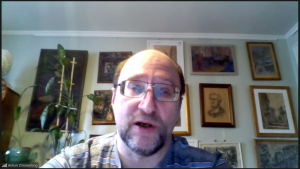 |
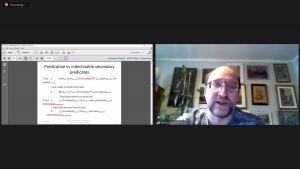 |
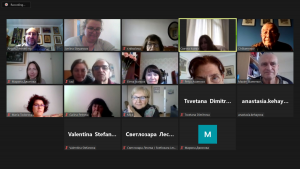 |
Lecture of prof. Yovka Tisheva, 04.12.2021
Prof. Yovka Tisheva delivered a lecture to students on the MA programme “Slavic languages” (second year) and on the BA programme “Bulgarian Language” (second year) at the St Petersburg State University.
The lecture took place on 4th December 2021 (12.40 – 14.10, Moscow time) online. The lecture was titled “Syntactic features of Bulgarian oral speech. Shifts and dislocations in stative predicates and predicatives” and covered some general features of the syntax of speech related to tendencies towards compression of linguistic means and linguistic redundancy (accumulation; utterance expansion). The emphasis of the presentation was the highlighting the structural patterns of sentences with stative predicates and predicatives and the manifestations of mandatory and optional doubling of the complement. The variants of impersonal sentences with stative predicates were commented on, in which the complement expresses the argument marked by the semantic role of Experiencer.
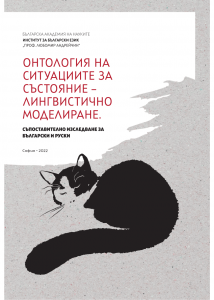 |
ONTOLOGY OF STATIVE SITUATIONS – LINGUISTIC MODELING. A CONTRASTIVE BULGARIAN-RUSSIAN STUDY Editors: Svetla Koeva, Elena Ivanova, Yovka Tisheva and Anton Zimmerling Reviewers: prof. Krasimira Aleksova, prof. Petya Osenova (pdf)
|
01 – Svetla Koeva. Elena Ivanova
Оntology of stative situations – linguistic modeling. A contrastive Bulgarian-Russian Study. Preface
Koeva, Svetla, Elena Ivanova, Yovka Tisheva, Anton Zimmerling (eds.). Ontology of Stative Situations – Linguistic Modeling. A Contrastive Bulgarian-Russian Study. Sofia: Prof. Marin Drinov Academic Publishing House of the Bulgarian Academy of Sciences, 2022, pp. 9–28. ISBN 978-619-245-256-8. (pdf)
DOI: 10.7546/STONTBgRu2022.01
02 – Anton Zimmerling
States, events and predicate types
Koeva, Svetla, Elena Ivanova, Yovka Tisheva, Anton Zimmerling (eds.). Ontology of Stative Situations – Linguistic Modeling. A Contrastive Bulgarian-Russian Study. Sofia: Prof. Marin Drinov Academic Publishing House of the Bulgarian Academy of Sciences, 2022, pp. 31–52. ISBN 978-619-245-256-8. (pdf)
DOI: 10.7546/STONTBgRu2022.02
03 – Galina Kustova
Semantic classes of state predicates (based on evidence from Russian)
Koeva, Svetla, Elena Ivanova, Yovka Tisheva, Anton Zimmerling (eds.). Ontology of Stative Situations – Linguistic Modeling. A Contrastive Bulgarian-Russian Study. Sofia: Prof. Marin Drinov Academic Publishing House of the Bulgarian Academy of Sciences, 2022, pp. 53–67. ISBN 978-619-245-256-8. (pdf)
DOI: 10.7546/STONTBgRu2022.03
04 – Svetlozara Leseva, Ivelina Stoyanova
Stative verbs: conceptual structure, hierarchy, systemic relations
Koeva, Svetla, Elena Ivanova, Yovka Tisheva, Anton Zimmerling (eds.). Ontology of Stative Situations – Linguistic Modeling. A Contrastive Bulgarian-Russian Study. Sofia: Prof. Marin Drinov Academic Publishing House of the Bulgarian Academy of Sciences, 2022, pp. 68–114. ISBN 978-619-245-256-8. (pdf)
DOI: 10.7546/STONTBgRu2022.04
05 – Svetla Koeva
The system of diatheses in Bulgarian and stative predicates
Koeva, Svetla, Elena Ivanova, Yovka Tisheva, Anton Zimmerling (eds.). Ontology of Stative Situations – Linguistic Modeling. A Contrastive Bulgarian-Russian Study. Sofia: Prof. Marin Drinov Academic Publishing House of the Bulgarian Academy of Sciences, 2022, pp. 117–160. ISBN 978-619-245-256-8. (pdf)
DOI: 10.7546/STONTBgRu2022.05
06 – Maria Ovsjannikova
Diatheses of Russian verbs of emotion
Koeva, Svetla, Elena Ivanova, Yovka Tisheva, Anton Zimmerling (eds.). Ontology of Stative Situations – Linguistic Modeling. A Contrastive Bulgarian-Russian Study. Sofia: Prof. Marin Drinov Academic Publishing House of the Bulgarian Academy of Sciences, 2022, pp. 161–179. ISBN 978-619-245-256-8. (pdf)
DOI: 10.7546/STONTBgRu2022.06
07 – Yovka Tisheva, Marina Dzhonova
Syntactic realization of stative predicates in Bulgarian (towards a lexical meaning ontology)
Koeva, Svetla, Elena Ivanova, Yovka Tisheva, Anton Zimmerling (eds.). Ontology of Stative Situations – Linguistic Modeling. A Contrastive Bulgarian-Russian Study. Sofia: Prof. Marin Drinov Academic Publishing House of the Bulgarian Academy of Sciences, 2022, pp. 180–209. ISBN 978-619-245-256-8. (pdf)
DOI: 10.7546/STONTBgRu2022.07
08 – Alexander Letuchiy
Argument structure of mental predicates in Russian: interaction of semantic, syntactic and discourse factors
Koeva, Svetla, Elena Ivanova, Yovka Tisheva, Anton Zimmerling (eds.). Ontology of Stative Situations – Linguistic Modeling. A Contrastive Bulgarian-Russian Study. Sofia: Prof. Marin Drinov Academic Publishing House of the Bulgarian Academy of Sciences, 2022, pp. 210–246. ISBN 978-619-245-256-8. (pdf)
DOI: 10.7546/STONTBgRu2022.08
09 – Galina Kustova
Semantic types of infinitive constructions of Russian predicatives
Koeva, Svetla, Elena Ivanova, Yovka Tisheva, Anton Zimmerling (eds.). Ontology of Stative Situations – Linguistic Modeling. A Contrastive Bulgarian-Russian Study. Sofia: Prof. Marin Drinov Academic Publishing House of the Bulgarian Academy of Sciences, 2022, pp. 247–280. ISBN 978-619-245-256-8. (pdf)
DOI: 10.7546/STONTBgRu2022.09
10 – Anton Zimmerling
Dative-infinitive structures and syntactic idioms in Russian
Koeva, Svetla, Elena Ivanova, Yovka Tisheva, Anton Zimmerling (eds.). Ontology of Stative Situations – Linguistic Modeling. A Contrastive Bulgarian-Russian Study. Sofia: Prof. Marin Drinov Academic Publishing House of the Bulgarian Academy of Sciences, 2022, pp. 281–300. ISBN 978-619-245-256-8. (pdf)
DOI: 10.7546/STONTBgRu2022.10
11 – Maxim Stamenov, Anton Zimmerling
Dative-predicative structures and the syntax-semantics interface in Russian and Bulgarian
Koeva, Svetla, Elena Ivanova, Yovka Tisheva, Anton Zimmerling (eds.). Ontology of Stative Situations – Linguistic Modeling. A Contrastive Bulgarian-Russian Study. Sofia: Prof. Marin Drinov Academic Publishing House of the Bulgarian Academy of Sciences, 2022, pp. 303–357. ISBN 978-619-245-256-8. (pdf)
DOI: 10.7546/STONTBgRu2022.11
12 – Tsvetana Dimitrova, Valentina Stefanova, Maria Todorova
Predicative constructions and state semantics: a corpus study on Bulgarian and Russian
Koeva, Svetla, Elena Ivanova, Yovka Tisheva, Anton Zimmerling (eds.). Ontology of Stative Situations – Linguistic Modeling. A Contrastive Bulgarian-Russian Study. Sofia: Prof. Marin Drinov Academic Publishing House of the Bulgarian Academy of Sciences, 2022, pp. 358–384. ISBN 978-619-245-256-8. (pdf)
DOI: 10.7546/STONTBgRu2022.12
13 – Maria Todorova
Phraseological and phraseologized predicative constructions (observations based on Bulgarian-Russian parallel examples)
Koeva, Svetla, Elena Ivanova, Yovka Tisheva, Anton Zimmerling (eds.). Ontology of Stative Situations – Linguistic Modeling. A Contrastive Bulgarian-Russian Study. Sofia: Prof. Marin Drinov Academic Publishing House of the Bulgarian Academy of Sciences, 2022, pp. 385–403. ISBN 978-619-245-256-8. (pdf)
DOI: 10.7546/STONTBgRu2022.13
14 – Elena Ivanova, Galina Kustova, Svetlozara Leseva
Subject of opinion and subject of evaluation dative in colloquial Bulgarian (as compared with Russian).
Koeva, Svetla, Elena Ivanova, Yovka Tisheva, Anton Zimmerling (eds.). Ontology of Stative Situations – Linguistic Modeling. A Contrastive Bulgarian-Russian Study. Sofia: Prof. Marin Drinov Academic Publishing House of the Bulgarian Academy of Sciences, 2022, pp. 404–426. ISBN 978-619-245-256-8. (pdf)
DOI: 10.7546/STONTBgRu2022.14
15 – Elena Ivanova
Predicates of volition in the Bulgarian language in contrast with Russian
Koeva, Svetla, Elena Ivanova, Yovka Tisheva, Anton Zimmerling (eds.). Ontology of Stative Situations – Linguistic Modeling. A Contrastive Bulgarian-Russian Study. Sofia: Prof. Marin Drinov Academic Publishing House of the Bulgarian Academy of Sciences, 2022, pp. 427–457. ISBN 978-619-245-256-8. (pdf)
DOI: 10.7546/STONTBgRu2022.15
16 – Maria Ovsjannikova, Hristina Kukova
Perception predicates in Bulgarian and Russian and their sentential arguments
Koeva, Svetla, Elena Ivanova, Yovka Tisheva, Anton Zimmerling (eds.). Ontology of Stative Situations – Linguistic Modeling. A Contrastive Bulgarian-Russian Study. Sofia: Prof. Marin Drinov Academic Publishing House of the Bulgarian Academy of Sciences, 2022, pp. 458–484. ISBN 978-619-245-256-8. (pdf)
DOI: 10.7546/STONTBgRu2022.16
17 – Alexander Letuchiy, Marina Dzhonova
Infinitive and finite complement clauses in Russian and their correspondences with the complementizers че and да in Bulgarian
Koeva, Svetla, Elena Ivanova, Yovka Tisheva, Anton Zimmerling (eds.). Ontology of Stative Situations – Linguistic Modeling. A Contrastive Bulgarian-Russian Study. Sofia: Prof. Marin Drinov Academic Publishing House of the Bulgarian Academy of Sciences, 2022, pp. 485–509. ISBN 978-619-245-256-8. (pdf)
DOI: 10.7546/STONTBgRu2022.17
The public review of the project ONTOLOGY OF STATIVE SITUATIONS – LINGUISTIC MODELING. A CONTRASTIVE BULGARIAN-RUSSIAN STUDY took place on 29 November 2022 at 14:00. The presentation was attended by 26 people and the Russian partners took part remotely via Zoom.
Public presentation
- Prof. Svetla Koeva presented a summary of the objectives and results of the project “Ontology of stative situations – linguistic modeling. A contrastive Bulgarian-Russian study” funded by the National Science Fund

- Prof. Elena Ivanova (St Peterburg State University) presented joint research between members of the Russian and the Bulgarian teams

- Prof. Yovka Tisheva (Sofia University) presented the descriptio of the syntactic structure of stative predicates in Bulgarian

- Prof. Maksim Stamenov presented the description of the semantic structure of stative predicatives in Bulgarian

- Prof. Anton Zimmerling (Alexander Pushkin State Institute for Russian Language) presented the theoretical results of the Russian team

Reviews
- Prof. Krasimira Aleksova (Sofia University) emphasised on the quantitative results of the project in terms of number of publications and released resources. Prof. Aleksova values the substantial contributions of the project in the context of Bulgarian and Rissian linguistics as well as worldwide
 ➥ Review by prof. Krasimira Aleksova
➥ Review by prof. Krasimira Aleksova - Prof. Petya Osenova (Sofia University) accented on the holistic approach to delivering the project objectives, as well as on the connection between morphology, syntax, semantics and entering the field of ontologies. According to prof. Osenova, the most significant contribution is the practical applicability of the semantic and syntactic typology to other languages.
 ➥ Review by prof. Petya Osenova
➥ Review by prof. Petya Osenova
Comments
Assoc. prof. Tatyana Alexandrova believes that the results, which exceed the initial plan, are due to the well-structured and organised team on both the Bulgarian and the Russian side. According to her, a significant contribution is the combination of theoretical research hypotheses with empirical data that verify the theoretical propositions.
For assoc. prof. Milen Tomov the most valuable contribution is that the project opens up a wide perspective for future research. According to him, it would be interesting to compare the data to data from another languages especially since the theoretical basis provides such an opportunity.
Published reviews
➥ Krasimira Aleksova. New studies devoted to the ontology of status situations in the Bulgarian and Russian languages. Bulgarian Language and Literature, volume 65, issue 1, 2023. (pdf)





